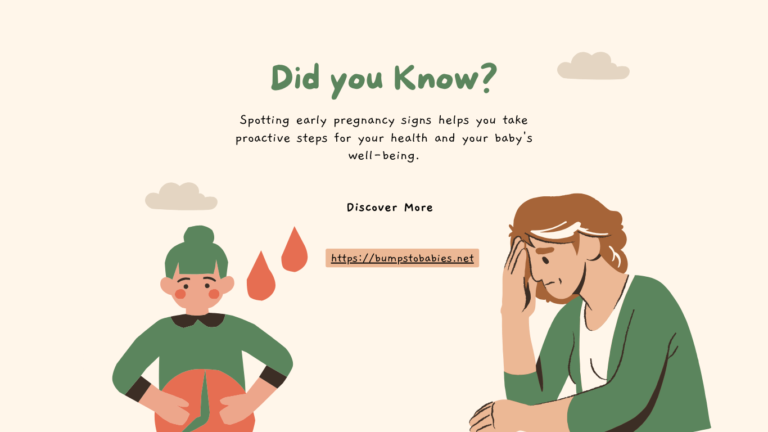Introduction
Congratulations! Embarking on the beautiful journey of motherhood is truly special. But how do you know you’re expecting before it becomes obvious? Spotting early pregnancy signs can help. This post is for all you wonderful expecting mothers out there. We’ll explore the subtle, early signs of pregnancy, so you can recognize them and take care of yourself right from the start.
Understanding Early Pregnancy Symptoms
Pregnancy symptoms vary for every woman. Some may experience several signs early on, while others might not notice any at all. It’s essential to understand that these symptoms can appear in the first few weeks of conception, sometimes even before you miss your period.
The Importance of Spotting Early Pregnancy
Recognizing early pregnancy signs is crucial for ensuring the health and well-being of both the mother and the baby. Early detection allows you to start prenatal care promptly, adopt a healthier lifestyle, and avoid activities that could harm your developing baby.
Missed Period
One of the most common and earliest signs of pregnancy is a missed period. If your menstrual cycle is regular and you suddenly miss your period, it’s time to take a pregnancy test. However, some women experience light spotting around the time their period is due, which can be confused with a period.
Morning Sickness
Morning sickness, characterized by nausea and vomiting, often begins around the sixth week of pregnancy. For some, it might start earlier and can occur at any time of the day. Eating small, frequent meals and avoiding strong smells can help manage morning sickness.
Tender, Swollen Breasts
Hormonal changes during early pregnancy can cause your breasts to become tender, swollen, or sore. This symptom can start as early as one to two weeks after conception and may feel similar to the discomfort experienced before a period.
Fatigue
Feeling unusually tired? Increased levels of the hormone progesterone during early pregnancy can make you feel exhausted. Adequate rest, a healthy diet, and light exercise can help combat fatigue and boost your energy levels.
Frequent Urination
Around six to eight weeks after conception, you may find yourself needing to urinate more frequently. This is due to hormonal changes and increased blood flow to your kidneys, which helps your body remove waste more efficiently.
Food Cravings and Aversions
Cravings for certain foods or sudden aversions to foods you used to enjoy can be early signs of pregnancy. These changes in taste and smell are attributed to hormonal fluctuations and can occur as early as two to three weeks after conception.
Mood Swings
Hormonal changes can also cause mood swings, making you feel more emotional or irritable than usual. It’s important to communicate with your partner and loved ones about how you’re feeling and seek support when needed.
Bloating and Constipation
Progesterone can slow down your digestive system, leading to bloating and constipation. Drinking plenty of water, eating fiber-rich foods, and engaging in light physical activity can help alleviate these symptoms.
Light Spotting and Cramping
Some women experience light spotting and cramping, known as implantation bleeding, when the fertilized egg attaches to the uterine lining. This usually occurs around six to twelve days after conception and is generally lighter and shorter than a regular period.
Headaches and Dizziness
Hormonal changes and increased blood volume can cause headaches and dizziness during early pregnancy. Staying hydrated, eating regularly, and getting enough rest can help manage these symptoms.
Elevated Basal Body Temperature
Tracking your basal body temperature (BBT) can be a useful tool in detecting early pregnancy. If your BBT remains elevated for more than two weeks after ovulation, it could be an indication of pregnancy.
Increased Sensitivity to Smells
A heightened sense of smell is another early sign of pregnancy. You may find certain odors more intense or unpleasant, which can contribute to nausea and food aversions.
Changes in Cervical Mucus
During early pregnancy, you may notice changes in your cervical mucus. It can become thicker, creamier, and more abundant. Monitoring these changes can help you identify early pregnancy.
Conclusion
Spotting early pregnancy signs helps you take proactive steps for your health and your baby’s well-being. From missed periods to food cravings, these early indicators can guide you through the first stages of this incredible journey. If you suspect you might be pregnant, take a test and consult your healthcare provider for confirmation and next steps. Your adventure into motherhood is just beginning, and we’re here to support you every step of the way.
For more information and personalized advice, consider booking an appointment with a healthcare professional who can provide guidance tailored to your unique situation. Here’s to a healthy and joyful pregnancy!
After reading about the conversion of spotting early pregnancy, click this link to explore a collection of pregnancy-related articles.
Join Our Community!
Are you looking for support, advice, or just a friendly chat about pregnancy and parenting? Join our community on Facebook! Connect with other parents, share your experiences, and get answers to all your questions.
Additional Resources
For more information on pregnancy, childbirth, and postpartum care, check out the following resources:
- American Pregnancy Association: https://americanpregnancy.org/
- March of Dimes: Provides information on pregnancy, childbirth, and newborn health. https://www.marchofdimes.org/
- The Bump: Offers a wide range of articles, tools, and community support for expecting and new parents. https://www.thebump.com/
- La Leche League International: Offers breastfeeding support, resources, and information for pregnant and breastfeeding mothers. https://www.llli.org/
Remember to always consult with your healthcare provider for personalized advice and recommendations. Take care of yourself and your growing baby and enjoy the journey of motherhood!


Comments are closed.